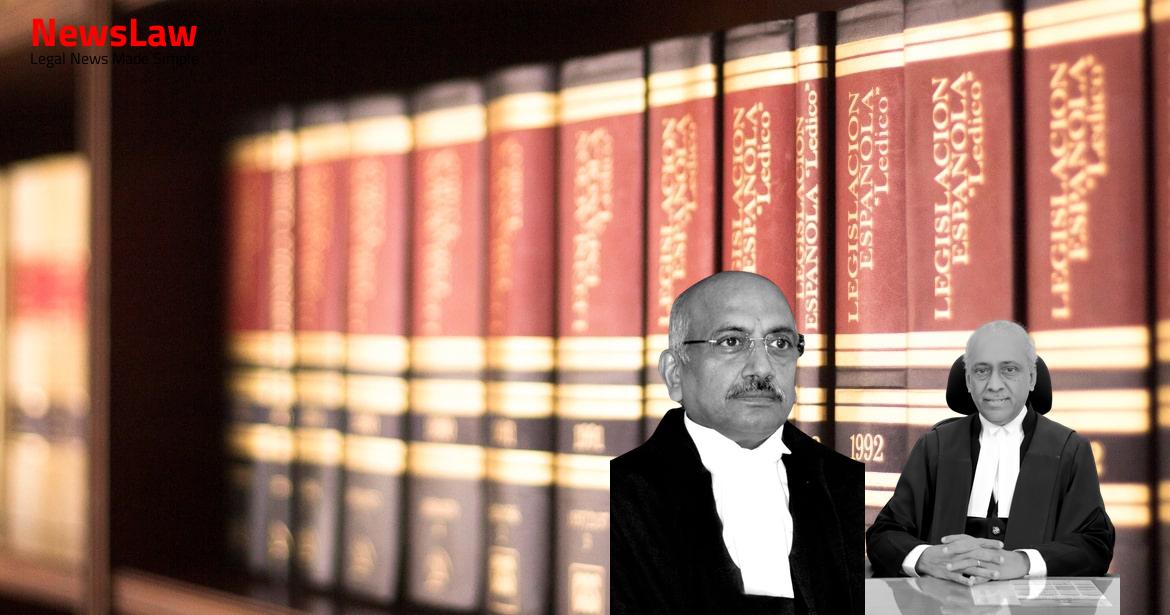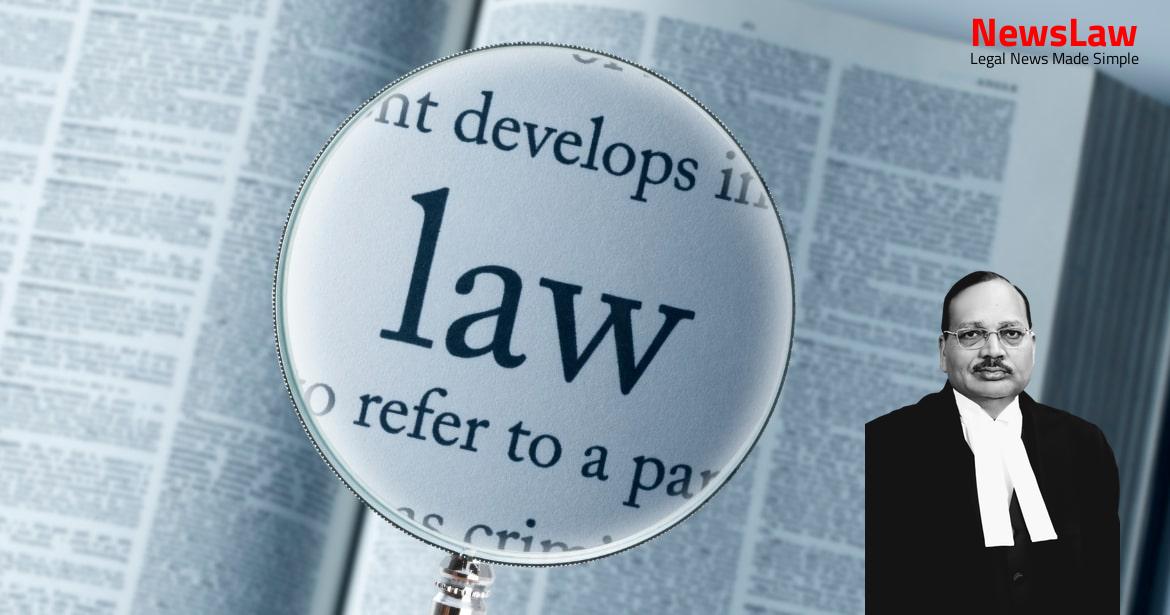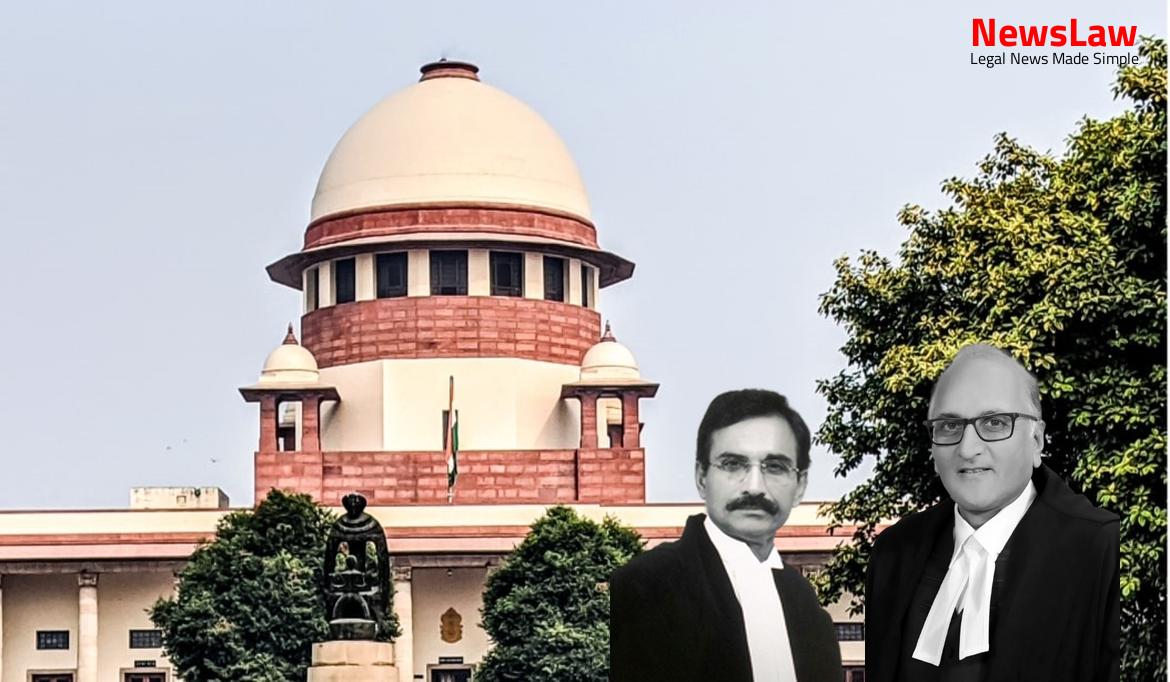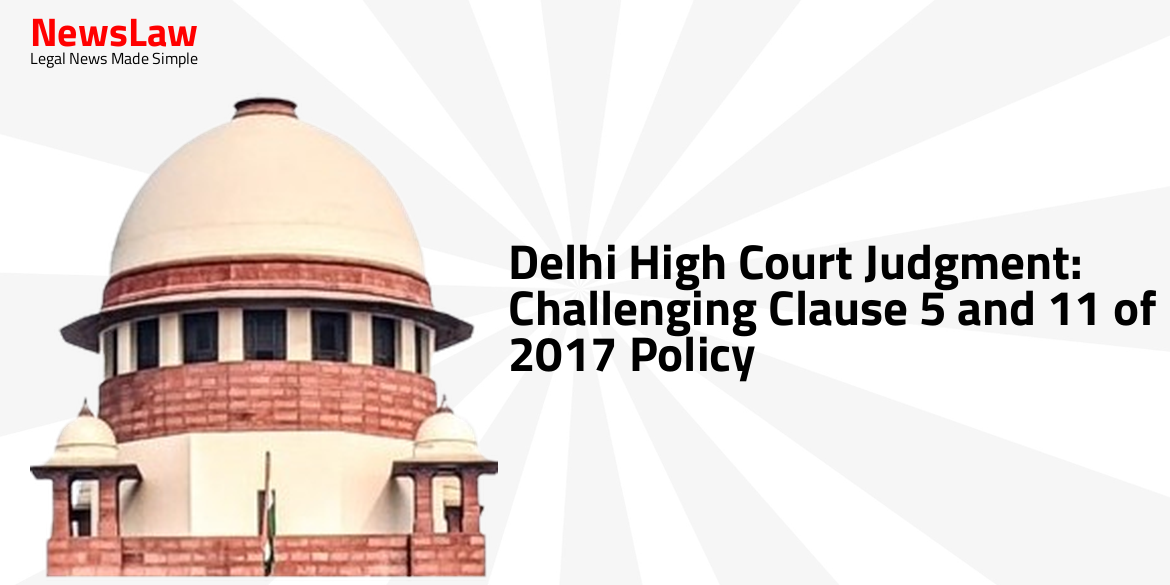Explore a detailed legal analysis focusing on compensation claims in a complex land acquisition dispute. The court’s assessment delves into the intricacies of various factors such as severance, injurious affection, and transportation costs, providing valuable insights into the legal framework governing such disputes.
Facts
- The appellant filed an appeal in First Appeal No.709 of 1991 due to dissatisfaction with the quantum fixed.
- The State of Maharashtra filed an appeal in First Appeal No.653 of 1991, aggrieved by the enhancement and fixation of compensation.
- The award by the Reference Court was divided into two parts, one related to Embankments, C.D. Works, etc., and the other to Compensation as awarded by S.L.A.O No.1, Pune.
- The township established by the appellant covers a vast area of about 16000 acres of land, located 136 kms away from Pune.
- A section of the trolley line passed through the proposed land, and compensation was claimed for the same.
- The appellant faced setbacks in compensation claims related to rails & sleepers, rolling stocks, and increase in transportation costs before the High Court.
- The appellant laid a 36 km narrow gauge trolley line from Walchandnagar to Bhigwan for transportation of heavy engineering goods.
- There were disputes regarding compensation for obsolete rails and sleepers, with the appellant claiming they could only be sold as scrap.
- Several awards were passed as the appellant’s lands were located in different villages within the acquired area.
- A summary of the compensation claims, awards, and reductions made by the High Court under different heads was presented for clarity.
- The High Court found that the appellant company did not bring before the Court the book value of the rolling stock.
- Compensation for the rails and sleepers in the trolley line for a distance of 7 kms was calculated based on the depreciated cost fixed by the Reference Court at Rs.1,56,650/- per km.
- The High Court rejected the claim of the appellant for compensation for rails and sleepers covering 28 kms due to lack of basis for allowing such a claim for 10 years.
- The High Court awarded compensation for the rails and sleepers in the trolley line for a distance of 7 kms submerged in backwaters after deducting the scrap value, totaling Rs.17,79,884/-.
- The Reference Court fixed compensation for the rolling stock at Rs.17,79,884.70 after deducting the scrap value and noted the company’s inaction for laying the alternative trolley line as a premium.
- The High Court set aside the compensation awarded by the Reference Court for increase in transportation cost, citing lack of loss shown by the appellant from balance sheets.
- The High Court reversed the finding of Reference Court regarding loss of profits on account of transportation cost increase, as balance sheets did not reveal any loss.
- The High Court awarded various compensations totaling to Rs.26,80,607.80 and mentioned the entitlement of interest on the compensation amount.
- The High Court rejected the compensation claim for rails and sleepers for 28 kms, stating that the appellant did not suffer any loss and did not take effective steps to lay an alternative trolley line.
- The High Court found that the rolling stock continued to be used till 1983, denying compensation for the same on that basis.
- The Reference Court’s calculation for depreciated value of rolling stock was overturned by the High Court based on the continued use of the stock till 1983.
- Various expert testimonies were considered, but ultimately, the High Court reversed the compensation granted for rolling stock by the Reference Court.
Also Read: Undisclosed Conviction for Dharna Under Police Act Leads to Overturned Election
Issue
- The dispute is currently limited to three specific claims
- These claims include rails and sleepers, rolling stocks, and an increase in transportation cost
- The judgement will address each of these claims separately
Also Read: Critical Analysis of Legal Principles in a High-Profile Criminal Case
Arguments
- Respondent contended that no compensation was payable towards rails and sleepers as appellant also claimed compensation for switching from rail to road transport.
- Witnesses estimated cost of rails and sleepers at Rs.50,08,288 after adjusting for depreciation and material sale value.
- The owners of the tea estate were held entitled to compensation for the affected 8 acres of tea land behind the butts by Doss, J.
- Appellant’s senior counsel argued that finding an alternative route for trolley line was not feasible due to cost and operational concerns.
- Appellant could prove higher transportation cost by road and presented evidence of reduced profits post-acquisition.
- High Court interfered with the award of the Reference Court which the appellant’s counsel argued against.
- Appellant set up a claim about redundancy in unacquired trolley line but had switched to road transport in 1972.
- Argument made based on Wazir vs. State of Haryana that additional compensation under ‘thirdly’ of Section 23(1) is only warranted if the quality of the left-over land is effectively diminished.
- Contention by the Government that injury from rifle range was contingent and fell under actionable nuisance was rejected.
- Acquisition of land for alternative trolley line was deemed challenging due to multiple landowners, making severance charges inapplicable.
- Working on land behind the butts during firing is extremely unsafe
- Resulting loss of time increases the cost of cultivation
Also Read: Interpretation of Stamp Duty Provisions
Analysis
- The High Court’s decision to deny compensation for injurious affection to rolling stock and increase in transportation costs was deemed reasonable.
- The claim for compensation towards loss of earnings was rejected due to overlapping with the claim for increase in transportation costs.
- The distinction between injurious affection to earnings and diminution of profits under clauses fourthly and sixthly of Section 23(1) was highlighted.
- The claim for severance and injurious affection was a mix of items falling under clauses thirdly, fourthly, and sixthly of Section 23(1).
- The appellant’s claim was restricted in the current appeals to the value of rails and sleepers, rolling stock, and increase in transportation costs under clause fourthly of Section 23(1).
- In cases of land acquisition, Section 49 provides for the acquisition of a part or the whole of a property based on the owner’s desire.
- Section 23(1) of The Land Acquisition Act, 1894 outlines the factors to be considered in determining compensation, including damage due to severance and injurious affection.
- The distinction between severance and injurious affection must be understood in conjunction with Section 49.
- Section 49 allows the appropriate Government to order the acquisition of the whole land if it deems severance compensation claim excessive.
- Different clauses of Section 23(1) deal with various aspects of compensation, including market value, damage to crops, severance, injurious affection, and expenses incurred by the owner.
- The determination of compensation under Sections 23(1) and 49 involves consideration of various factors for fair and just compensation.
- One of the landowners claimed that a part of the compound of a cinema theatre was acquired compulsorily, depriving the owner of providing additional amenities to patrons and expanding the business.
- The claim was based on clauses thirdly, fourthly, and sixthly of Section 23(1) regarding compensation entitlement.
- While the Court agreed on the entitlement principle, the claim was rejected due to lack of evidence showing loss by severance, injurious effect on the remaining land, or affected earnings of the owners.
- In the case of Balammal vs. State of Madras, the Court dealt with a land acquisition under the Madras City Improvement Trust Act, where the Board of Trustees could acquire land with government sanction under the Land Acquisition Act, 1894.
- The impugned judgment is not interfered with in respect of all other claims.
- Both parties stand on different footings.
- The appeals are partly allowed, setting aside the portion of the findings and conclusions where the award of compensation for injurious affection to rails and sleepers was reversed by the High Court.
Decision
- The High Court of Bombay allowed the appeal of the respondents and reduced the award amount.
- There will be no order to costs.
- Land Acquisition Officer may prepare fresh calculations and enforce the bank guarantee only to the extent of disallowed portion.
- The award amount of Rs.2,72,25,680/- was deposited by the respondents on 17.07.1992.
- The award of the Reference Court granting a sum of Rs.31,21,860/- towards compensation for rails and sleepers shall stand restored.
- The appellant withdrew the said amount after furnishing a bank guarantee.
- Interim stay of enforcement of the bank guarantee by the respondent if provided by the petitioner.
- The appellant will be entitled to retain a certain amount as per the judgment and pay the excess amount to the respondents within four weeks.
- The bank guarantee should be kept alive as per the order of the Court dated 16.03.2009.
Case Title: WALCHANDNAGAR INDUSTRIES LTD. Vs. THE STATE OF MAHARASHTRA (2022 INSC 146)
Case Number: C.A. No.-002671-002672 / 2016



